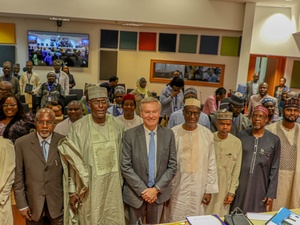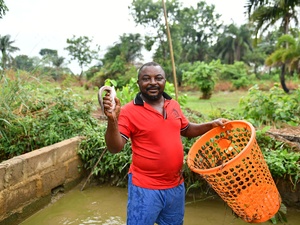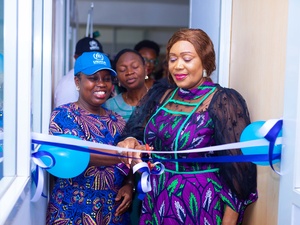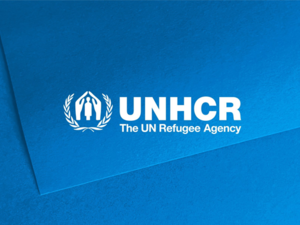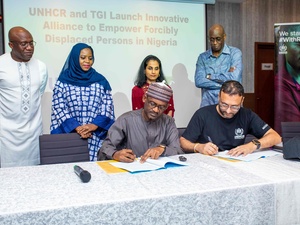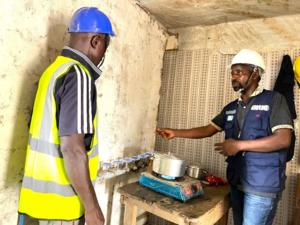The leader who came out of tumultuous waters

The leader who came out of tumultuous waters
Gerard walked three weeks through wild forest to safety, yearned to live in a refugee camp, wrote a business plan and built up a cooperative in only one year.
“I didn’t want to stay idle.” Gerard Tiko’or Akenji shrugs. “The day after arriving here in the camp, I went around to see what I could do.” A year later, he leads a farming cooperative out of Adagom settlement that improves the lives of some 250 people in Nigeria’s Cross River State.
But let us start from the beginning. “One day, they were arresting everybody in my street. First, I hid under a suspended fence and heard how they ransacked my house. In half an hour, it was shattered. Then I also got arrested. They accused me of instigating secession as more and more children were picking up arms”, Gerard recalls being drawn into the heart of the conflict between the central government and “fighters” calling for secession of the English-speaking regions in the West of Cameroon. “French language saved me on that day”, he says, “as I asked the Commander in French why he was doing this.” The experience is deeply rooted in Gerard. He breaks out in joy as his UNHCR visitor switches to French.
“They beat me and dropped me on the ground like a dead snake. In my mind I just said: That was it.”
The relief would not last long. Gerard got arrested four times. “I will not tell you how many times I was tortured.” Finally, he does. One day, when they were searching for his younger brother who had escaped from detention, they came after Gerard. “They beat me like never before and dropped me on the ground like a dead snake. In my mind I just said: That was it.”
It wasn’t. But that was it for Gerard’s life in Cameroon. A friend took a loan, and Gerard was released on bail. “As I haven’t paid the loan back, the bank is now selling my house”, he adds with a sigh. At the first opportunity, he headed for the border. “To pass it, I trekked for three weeks. I could not use a bike, as they would have shot me”, he recalls an experience that would mark his life ever since. “Nigeria was my last option when I had to leave everything behind.”
On his way, Gerard had to pay smugglers “because I did not know the way in the wild forest”. But the worst was still to come when he reached the tumultuous waters of a river. “Water really scares me”, he says, his eyes wide open, “I do not know how to swim. So, I was sitting in the middle of the boat, holding to my bench, and I couldn’t bear the guy standing at the end of the boat, arms moving, laughing and joking while I was fearing for my life.”
That was in March 2017. He hasn’t been with his wife and three children since then. They are in the Cameroonian capital Yaoundé. “They are safe”, he says. “We speak on videophone, mostly on weekends.”
When Gerard crossed into Nigeria, he already had a clear destination: a village near Ibadan, 13 hours’ drive from the Cameroonian border, where a “Facebook friend” needed someone to establish a farm. Gerard became that someone, but he was not happy. “I was alone in that area, I felt insecure. When I learned about the refugee camp in Adagom, I came here”, he explains.
The day after his arrival in the settlement, he went around to see the chances for agriculture. “Farming is my passion”, he says.
He soon found a piece of land and new contacts helped him lease one hectare from the Cross River State government. He and a few others started growing cassava and corn.
Later, they switched to cabbage. “We spoke to a few people, and they were interested”. The initiative attracted locals who joined, like Ogazi Martin Ede, a businessman and driver, some of whom were even inspired to farm for the first time in their lives. The joint initiative of some 50 refugees and members of the host community called itself United Farmers.
Nigerian and refugee farmers become Farmers United
Gerard even found out how to establish a formal cooperative in the country that has become his temporary home. As Board Chair of Farmers United Cooperative, he wrote a business plan for cabbage production that got sponsored by UNHCR, the UN Refugee Agency: The farmers received seeds, fertilizer, ten wheelbarrows, four big water tanks and pipes for irrigation. “We prepared some organic insecticides ourselves and bought some chicken dung”, Gerard adds. “For some of our members it was the first time they sowed cabbage.”
But the road to success was not free of setbacks. “We started with 66,000 plants in a nursery, but the rain washed them away. We had to do another nursery with 7,000, and it worked. Some cabbages weighed two to three kilos”, says the proud farmer.
“Before selling them, I advertised it on Facebook”, says Gerard, and buyers came from as far as Calabar, some 300 kilometers to the West. Costs and gains were equally shared with the Cooperative receiving 3 Naira (less than 1 US Cent) per cabbage for support to vulnerable people such as refugees with malnourished children, and for loans.

In addition, the Cooperative invests in joint activities. And there is no lack of plans for the future. To improve the nutrition of people in the settlement, Gerard wants to promote backyard gardening for auto consumption of tomatoes and peppers. In December 2020, he motivated interested members to breed pigs to a size that can be sold.
“What I like is that most of the farmers have learned something new that they can use if they go back”, concludes Gerard.
And the members of his Cooperative appreciate that the livelihoods of their families have improved. All in all, United Farmers made a difference in the lives of 250 refugees and locals so far. And counting.



